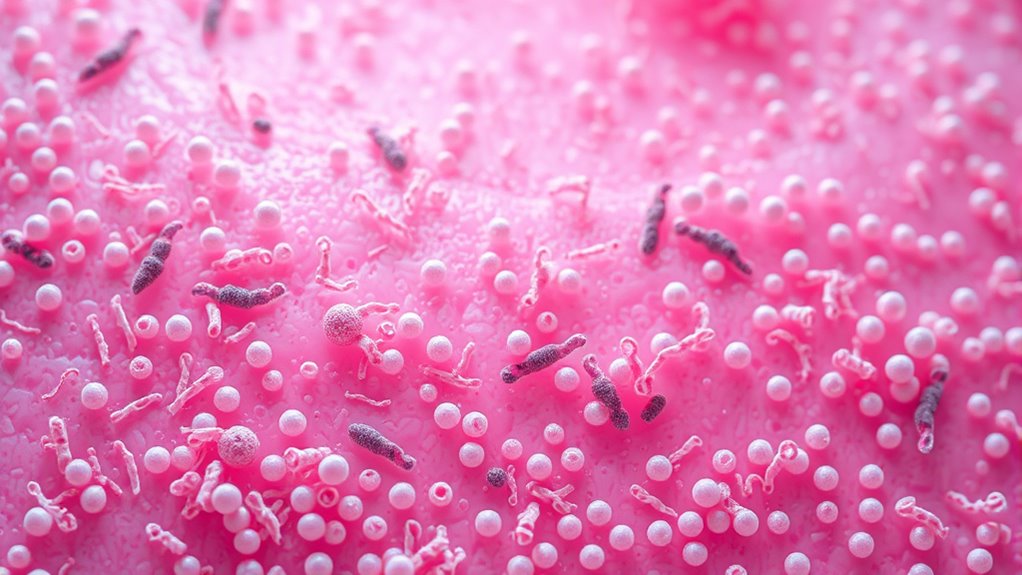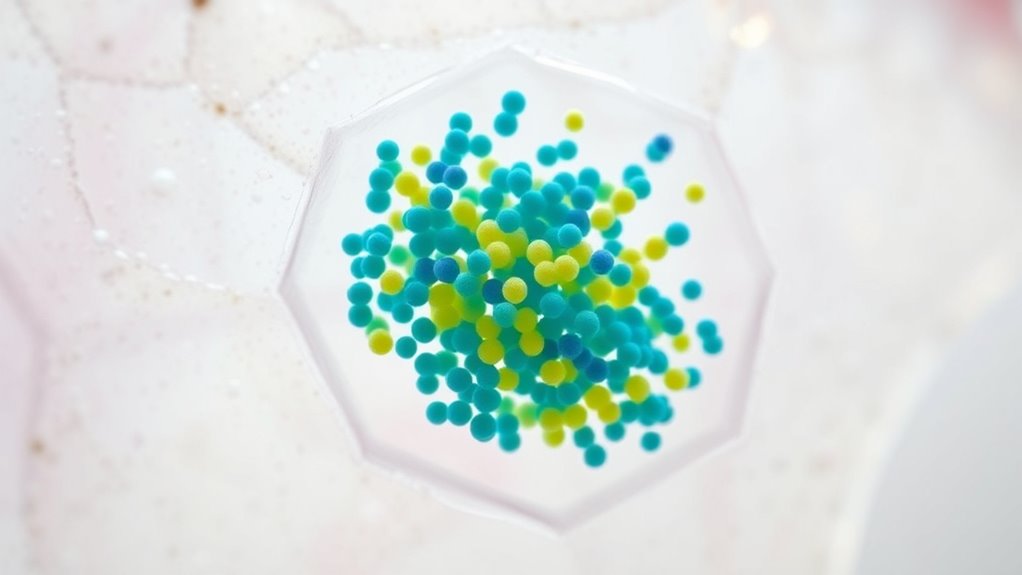Your vaginal microbiome is a community of friendly bacteria, mainly lactobacilli, that keep your vagina healthy by maintaining a low pH and fighting harmful microbes. Factors like antibiotics, hormonal shifts, scented products, or tight clothing can disrupt this balance. Signs of imbalance include unusual odor, discharge, or irritation. Staying aware of your body’s signals and practicing good hygiene helps maintain health. If you want to understand more about how to support your vaginal flora, keep exploring.
Key Takeaways
- The vaginal microbiome consists mainly of lactobacilli bacteria that produce lactic acid to maintain a healthy pH.
- A balanced microbiome protects against infections like bacterial vaginosis, yeast infections, and STIs.
- Disruptions from antibiotics, hygiene products, hormonal changes, or stress can cause imbalance and symptoms.
- Signs of imbalance include unusual odor, abnormal discharge, itching, or soreness requiring medical attention.
- Maintaining vaginal health involves good hygiene, a healthy diet, avoiding irritants, and regular medical check-ups.
What Is the Vaginal Microbiome?

The vaginal microbiome refers to the community of microorganisms that naturally live in your vagina. These tiny organisms include bacteria, fungi, and other microbes, working together to maintain your vaginal health. Most of these bacteria are beneficial, helping to keep harmful bacteria in check and supporting a healthy environment. Your microbiome is unique to you, influenced by factors like age, hormonal changes, and lifestyle. It forms a delicate balance that can be disrupted by infections, antibiotics, or other health issues. Understanding this community is essential because it plays a pivotal role in protecting against infections and maintaining overall vaginal well-being. Keeping this ecosystem healthy is key to feeling your best and preventing discomfort.
The Role of Good Bacteria in Vaginal Health

Good bacteria play a vital role in maintaining your vaginal health by creating a balanced environment that wards off harmful microbes. These beneficial microorganisms, mainly lactobacilli, produce lactic acid that keeps the vaginal pH low, making it inhospitable to infections. They also generate substances that inhibit the growth of harmful bacteria and fungi. When these good bacteria thrive, your vagina stays healthy and resilient. To support their presence, you can:
- Consume probiotic-rich foods like yogurt and kefir
- Avoid unnecessary use of antibiotics that kill beneficial bacteria
- Practice good hygiene without over-washing or using harsh soaps
- Supporting the beneficial bacteria in your body can enhance overall vaginal health.
Factors That Can Disrupt the Microbiome Balance

Various factors can upset the delicate balance of your vaginal microbiome, making it easier for harmful bacteria and fungi to take hold. Antibiotics are a common disruptor because they kill both good and bad bacteria, often leaving your system vulnerable. Hormonal changes, like those during pregnancy or menopause, can also alter the environment, reducing beneficial bacteria. Douching or using scented products can disturb the natural pH, diminishing the good bacteria’s ability to thrive. Stress and poor nutrition weaken your immune system, making it harder to maintain microbial balance. Additionally, tight clothing and synthetic fabrics trap moisture, creating a breeding ground for bacteria and fungi. Recognizing these factors helps you take steps to protect your vaginal health and maintain a balanced microbiome. Advances in AI in Education are also influencing health research, offering new tools for understanding microbiome health.
Signs of an Imbalanced Vaginal Microbiome

When your vaginal microbiome becomes imbalanced, it often shows clear signs that something isn’t right. You might notice changes that feel uncomfortable or unusual. One common sign is a strong, fishy odor that lingers after your shower. You may also experience abnormal discharge—thick, grayish, or yellowish—that’s different from your usual pattern. It’s also possible to feel itching, irritation, or soreness around your vulva. These symptoms indicate that the natural balance of bacteria has shifted. Keep an eye out for these signs, and don’t ignore persistent discomfort. Recognizing them early helps you seek appropriate care. Addressing these symptoms promptly can prevent more serious infections and maintain your vaginal health. Additionally, changes in your vaginal microbiome can sometimes be linked to family photoshoot fails, where unexpected stress or environmental factors disrupt your body’s natural balance.
Ways to Support and Maintain a Healthy Microbiome

Supporting and maintaining a healthy vaginal microbiome involves simple, everyday habits that promote balanced bacteria. First, practice good hygiene by washing with mild, unscented soap and water, avoiding harsh cleansers that can disrupt your natural flora. Wear breathable cotton underwear and avoid tight clothing to reduce moisture buildup, which can encourage harmful bacteria. Eating a balanced diet rich in fiber, fruits, and vegetables supports overall health and immune function, helping your microbiome stay in check. Staying hydrated helps maintain vaginal pH balance. Avoid douching or using scented products, as they can upset your natural bacterial balance. Regularly changing tampons and pads prevents bacterial overgrowth. Additionally, choosing air purifiers with HEPA filtration can improve indoor air quality and support overall health, including your microbiome. Finally, manage stress, as high stress levels can impact your immune system and microbiome health.
When to Seek Medical Advice for Vaginal Health

You should see a doctor if symptoms persist despite home care or if you notice sudden changes in your vaginal health. Unusual discharge or a strong odor are signs that something may be off and need professional evaluation. Trust your instincts and seek medical advice when your body signals that something isn’t right. Monitoring your vaginal microbiome can help identify imbalances that may require treatment.
Persistent Symptoms Warrant Care
How can you tell if a vaginal symptom needs medical attention? Persistent symptoms that last more than a few days, worsen over time, or don’t respond to home treatments should raise concern. If you experience any of these, it’s time to see a healthcare provider. – Unusual or strong odor that doesn’t go away – Persistent itching, burning, or irritation – Abnormal vaginal discharge that’s thick, yellow, green, or has a foul smell. These signs could indicate infections or other issues needing medical diagnosis and treatment. Don’t ignore ongoing discomfort or changes in your body’s signals. Prompt care helps prevent complications and ensures your vaginal health remains balanced and comfortable. When symptoms persist, trusting your instincts and seeking professional advice is always the best move. Additionally, understanding the importance of color accuracy in diagnosing infections can be crucial for accurate assessment and treatment.
Sudden Changes Signal Issues
Sudden changes in your vaginal symptoms can be a clear sign that something isn’t right and may require medical attention. If you notice a sharp increase in odor, a new or worsening itching sensation, or abnormal bleeding outside your regular periods, it’s time to see a healthcare provider. Unexpected pain during urination or intercourse is also a warning sign. These abrupt shifts can indicate infections or other issues needing diagnosis and treatment. Don’t overlook these signs or assume they’ll resolve on their own. Prompt medical advice ensures proper care and prevents complications. Trust your instincts—if your symptoms change suddenly or feel severe, schedule an appointment promptly to protect your vaginal health. Recognizing vaginal microbiome imbalances can also help you understand the underlying causes of these symptoms.
Unusual Discharge Needs Attention
Unusual vaginal discharge can be a sign that your body is responding to an infection or other imbalance. If you notice a change in color, smell, or texture, it’s time to pay attention. Seek medical advice if you experience:
- Discharge that is green, yellow, or gray, especially with a foul odor
- Discharge accompanied by itching, burning, or irritation
- Unusual bleeding outside of your regular period
These signs could indicate infections like bacterial vaginosis, yeast infections, or STIs. Don’t ignore persistent or severe symptoms, as timely treatment can prevent complications. Awareness of symptoms related to vaginal health includes recognizing discharge changes that may signal underlying issues. Trust your instincts—if something feels off, consult a healthcare professional to ensure your vaginal health stays balanced and healthy.
Frequently Asked Questions
Can Diet Influence My Vaginal Microbiome?
Your diet definitely influences your vaginal microbiome. Eating foods rich in probiotics, like yogurt and fermented products, helps promote healthy bacteria. Incorporating fiber supports overall gut and vaginal health. Avoiding excessive sugar and processed foods can prevent harmful bacteria growth. Staying hydrated and maintaining a balanced diet helps keep your vaginal environment balanced. So, yes, what you eat plays a significant role in maintaining a healthy vaginal microbiome.
Do Probiotics Effectively Restore Vaginal Microbial Balance?
Probiotics can help restore your vaginal microbial balance, but their effectiveness varies. When you take specific strains like Lactobacillus, they may replenish beneficial bacteria and improve symptoms of imbalance. However, results differ from person to person, and not all probiotic products are equally effective. It’s best to choose clinically tested options and consult your healthcare provider to determine if probiotics are right for your situation.
How Does Menopause Affect Vaginal Microbiome Health?
They say, “Change is the only constant,” and menopause certainly brings change. As you go through menopause, your hormone levels shift, which can cause the vaginal microbiome to become less balanced. This may lead to dryness, irritation, and increased infection risk. You might notice these changes, but staying proactive with good hygiene, regular check-ups, and possibly probiotics can help support your vaginal health through this shift.
Are There Specific Hygiene Products That Support Microbiome Health?
You might wonder if certain hygiene products help your microbiome stay balanced. Opt for gentle, fragrance-free cleansers that don’t strip natural oils or disrupt your pH. Avoid douches, scented wipes, and harsh soaps, as they can upset your vaginal flora. Instead, choose products formulated specifically for sensitive skin and maintain regular, mindful hygiene habits. Staying hydrated and wearing breathable underwear also supports your overall vaginal health.
Can Stress Impact the Composition of Vaginal Bacteria?
Stress can definitely impact your vaginal bacteria. When you’re stressed, your body releases hormones that can disrupt the balance of good and bad bacteria. This imbalance might lead to infections or discomfort. To support your vaginal health, try stress-reduction techniques like exercise, meditation, or deep breathing. Taking care of your mental well-being helps maintain a healthy microbiome, reducing the risk of issues caused by bacterial imbalance.
Conclusion
Did you know that a healthy vaginal microbiome is key to preventing infections and maintaining comfort? By understanding its importance and recognizing signs of imbalance, you can take proactive steps to support your health. Remember, up to 75% of women experience vaginal health issues at some point, but with proper care and attention, you can keep your microbiome balanced. Stay informed, listen to your body, and don’t hesitate to seek medical advice when needed.









